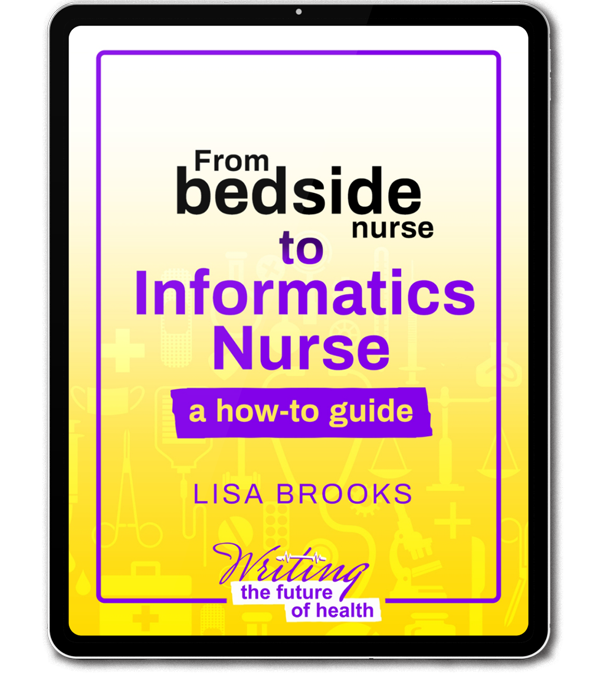The most common misconception about Nursing Informatics is that to be successful, nurses must be excellent with technology. Technology is one focus area of Nursing Informatics, but knowing technology does not mean you will be successful in this field. Far more important are the business skills you bring to the role. That is why I compiled a list of the 5 key business skills Informatics Nurses must have.

How is Nursing Informatics different from other Nursing specialties?
Nursing Informatics is a combination of Nursing, Computer Science, and Data Science. Informatics Nurses use technology and data to solve clinical problems and improve health outcomes. We are the bridge between clinical and technical, and are responsible for making sure technology is user-friendly and helpful for healthcare workers.
A master’s degree or certification is not required to become an Informatics Nurse. Where these can be helpful is if you plan to climb the career ladder and see yourself in various leadership roles. You can read about my experience getting an MSN in Nursing Informatics here.
The biggest differences between Nursing Informatics and other Nursing specialties are:
Difference #1 – Direct patient care: Informatics Nurses do not provide direct patient care, even though we may work in a clinical setting.

Difference #2 – Remote work options: Informatics Nurses have much more flexibility in work location, with many Informatics Nurses working remotely full-time. This allows nurses who want to live the laptop lifestyle and travel throughout the year to do so.
Difference #3 – Nursing Informatics is a business role: Nursing Informatics is a business role, not clinical. That may sound obvious after hearing that Informatics Nurses do not provide direct patient care. But a lot of nurses struggle with this idea. Even master’s-prepared Nursing Informatics graduates do not fully understand they are entering the business world. Nurses who want to be successful understand this and adjust how they approach their work.

What qualifications are needed to become an Informatics Nurse?
Another misconception is that the MSN in Nursing Informatics is required to enter this field. It is not, and neither is the Certification in Nursing Informatics. There are also plenty of Informatics Nurses who do not have a BSN. If you do a search for Nursing Informatics job postings, you will see a number of them list the BSN, MSN, and certification as ‘preferred’ (i.e. optional) qualifications.
HIMSS – the largest organization for health technology professionals – does an annual survey of Nursing Informatics specialists who are members of professional organizations. Their 2020 survey found that:
- Only 27% of respondents had a Master’s in Nursing Informatics
- 47% have a Bachelor’s Degree in Nursing
- About 15% have an Associate’s Degree in Nursing
Respondents ranged from LPNs to DNPs, just to give you a sense of how flexible this field is with education backgrounds.
So, what is required?
I recommend doing some research on job postings in your area with your current qualifications. Most job postings in my area (northeast U.S.) only require an RN license along with relevant experience. A BSN may be listed as ‘preferred’ – meaning optional – as is an MSN. But when I search nationally, I find a number that list either an RN or LPN license. However, all of the job postings specify candidates must have relevant experience.
Most of the time, recruiters and hiring managers are primarily looking for that relevant experience. In the business world, experience beats education nine times out of ten. If you put yourself in the hiring manager’s shoes, this makes sense.

The hiring manager likely has several major computer systems to keep running, and/or a big technology project underway. They do not want to waste their time hiring people who have all the degrees but little of the experience needed to jump in. They want candidates who can hit the ground running and need little training in tactical skills like project management, requirements gathering, and managing a budget.
The hiring manager is also most likely a business person, not a nurse. They may or may not know what a master’s or certification in Nursing Informatics qualifies you to do. This was a rude awakening for me when I graduated from my MSN program. One of my first bosses was a technology guy who asked me on three separate occasions if I ever went to grad school.
What a lot of nurses miss – including those who get MSNs in Nursing Informatics – is what the tactical business skills are that you need to learn and master.

5 Business Skills Informatics Nurses Must Have:
Without further delay, here are the five core business skills Informatics Nurses must have to be successful.
Skill #1: Communication
Regardless of which Nursing Informatics role you are in, communication will be a major part of it. Whether you are gathering business requirements for a new system (i.e. saying what the system needs to do to support how the end users work), or detailing a new process flow, successful Informatics Nurses are good communicators.

Informatics Nurses also have to keep key stakeholders in the loop as a project progresses. Stakeholders are the people who will be impacted by a project. They may be frontline nurses, nurse managers, Directors, and on up to Chief Nursing Officer. Informatics Nurses are responsible for making sure stakeholders have their voices represented, their needs conveyed, and are aware of what is coming before it happens.

Skill #2: Negotiation
Negotiation is a critical skill for Informatics Nurses, and not one taught in MSN programs in my experience. I learned how to negotiate in my MBA program as well as on-the-job. Because Nursing Informatics is a business role, you are expected to negotiate salary and benefits (as well as bonus and stock options if applicable). If for no other reason than to make sure you get the package that best reflects your wants and needs, you will need to learn how to negotiate.

However, negotiations do not just happen when it comes to job offers. Negotiation is also critical for working with stakeholders. Usually stakeholders in a project want everything no matter how small the project budget is, or how short a period of time you have to deliver it. They do not care if they are going from the equivalent of a tricycle to a Honda Civic. They want a Rolls Royce.
This is where negotiating project scope and deliverables comes in handy. Helping stakeholders to see what they are getting instead of just what they are not, making tradeoffs between time and money, and setting priorities are all ways Informatics Nurses negotiate in their day-to-day jobs.

Skill #3: Project Management
Project management is probably the most critical skill for Informatics Nurses. It is really a set of skills, and often a pathway from entry-level roles into six-figure salaries. In fact, when you compare the national average salary of an Informatics Nurse ($102,230) to a Healthcare Project Manager ($102,628), they are essentially the same. This is because there is so much overlap between the roles, with Informatics Nurses frequently leading projects. This involves the abilities to plan, organize, and implement projects that move an organization from current state to future state.

The whole goal of project management is to get a project from launch to successful completion. There are several different project management frameworks you may hear about, such as agile, scrum, and waterfall. Regardless of the framework used, the goal remains the same.

Skill #4: Time Management
Tied to project management is time management. Informatics Nurses leading projects will be working towards key milestones, or time points in a project when certain pieces of work must be completed. Their job is to make sure the project delivers on time, and to keep stakeholders in the loop on what is occurring when.
Time management also applies to an Informatics Nurse’s own schedule during the day. Unlike shift work where you clock-in and clock-out at certain times, in Nursing Informatics you design your own schedule. You have to be intentional about how you manage your time because there will be no one telling you how to spend your day. In our interview with Amy Qureshi, she talks about how that can be an adjustment for many nurses coming from the bedside.


Skill #5: Financial Management
Informatics Nurses need to understand finances from several perspectives. One perspective is value to the organization. You may hear this referred to as return on investment, or ROI. Whenever a project or initiative is launched, the organization should understand how it will provide value for the time, resources, and money invested.
Will it reduce the need for overtime? Can it improve scores on regulatory measures? Will it fill a staffing gap without needing to hire more personnel?

Another perspective on financial management is managing the actual budget for a project or initiative. Every resource comes with a cost, including staff who already work for an organization. A software developer does not have unlimited time – every hour spent on Project A means the developer cannot use that hour for Project B. If a project requires a vendor, there will be a bill that must be paid. This is another way in which Informatics Nurses must be comfortable with financial management.

Key Takeaways:
Nursing Informatics is a rewarding field that offers flexibility and excellent salaries. For nurses who want to be part of shaping health care’s future, this is one of the best places to be.
It is also important to recognize that Nursing Informatics is a business role, not a clinical role. That means nurses who enter this field need to build business skills. All of these skills can be learned and practiced. Once you learn these skills, you can use them anywhere you want to take your nursing career.

Found this topic interesting? You may have the makings for a great Informatics Nurse! Check out From Bedside Nurse to Informatics Nurse: A How-To Guide in our online store, or by clicking here!







0 Comments